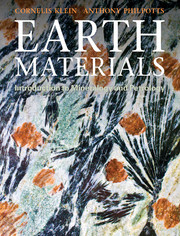Book contents
- Frontmatter
- Contents
- Preface
- Acknowledgments
- Chapter 1 Introduction
- Chapter 2 Materials of the solid Earth
- Chapter 3 How are minerals identified?
- Chapter 4 Fundamentals of crystal structures
- Chapter 5 Introduction to crystallography
- Chapter 6 Minerals and rocks observed under the polarizing optical microscope
- Chapter 7 Igneous rock-forming minerals
- Chapter 8 How do igneous rocks form?
- Chapter 9 Igneous rocks
- Chapter 10 Sedimentary rock-forming minerals and materials
- Chapter 11 Formation, transport, and lithification of sediment
- Chapter 12 Sedimentary rock classification, occurrence, and plate tectonic significance
- Chapter 13 Metamorphic rock-forming minerals
- Chapter 14 Metamorphic rocks
- Chapter 15 Some economic minerals, mainly from veins and pegmatites
- Chapter 16 Some selected Earth materials resources
- Chapter 17 Earth materials and human health
- Glossary
- Minerals and varieties
- Common igneous, sedimentary, and metamorphic rocks
- Index
- References
Chapter 14 - Metamorphic rocks
- Frontmatter
- Contents
- Preface
- Acknowledgments
- Chapter 1 Introduction
- Chapter 2 Materials of the solid Earth
- Chapter 3 How are minerals identified?
- Chapter 4 Fundamentals of crystal structures
- Chapter 5 Introduction to crystallography
- Chapter 6 Minerals and rocks observed under the polarizing optical microscope
- Chapter 7 Igneous rock-forming minerals
- Chapter 8 How do igneous rocks form?
- Chapter 9 Igneous rocks
- Chapter 10 Sedimentary rock-forming minerals and materials
- Chapter 11 Formation, transport, and lithification of sediment
- Chapter 12 Sedimentary rock classification, occurrence, and plate tectonic significance
- Chapter 13 Metamorphic rock-forming minerals
- Chapter 14 Metamorphic rocks
- Chapter 15 Some economic minerals, mainly from veins and pegmatites
- Chapter 16 Some selected Earth materials resources
- Chapter 17 Earth materials and human health
- Glossary
- Minerals and varieties
- Common igneous, sedimentary, and metamorphic rocks
- Index
- References
Summary
Metamorphism is the sum of all changes that take place in a rock when it experiences changes in temperature, pressure (both lithostatic and directed), or composition of fluids in the environment. The important word in this definition is change. The changes may be physical, chemical, isotopic, or any combination of these. The original rock, known as the protolith, can be igneous, sedimentary, or a previous metamorphic rock. Most metamorphic reactions are very slow, so time is important in determining how complete a change may be. Some rocks are more reactive than others, and higher temperatures and the presence of fluids also speed up reactions. Changes that take place while rocks are heating are referred to as prograde and those occurring during cooling are referred to as retrograde. Changes that take place at low temperatures during the compaction and lithification of sediments could, in the broadest sense, be considered metamorphic, but normally only reactions taking place above about 150°C are dealt with in metamorphic studies, but the division is arbitrary. Reactions have a greater chance of going to completion at the higher temperatures experienced by metamorphic rocks than they do in sedimentary rocks. At the highest temperatures, metamorphic rocks begin to melt, producing mixtures of metamorphic and igneous rocks known as migmatites.
- Type
- Chapter
- Information
- Earth MaterialsIntroduction to Mineralogy and Petrology, pp. 390 - 429Publisher: Cambridge University PressPrint publication year: 2012



